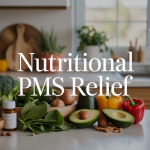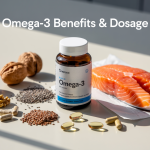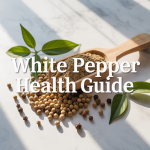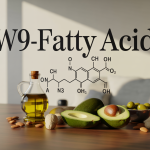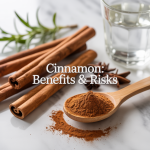Vitamin B1, also known as thiamine, is a water-soluble vitamin that your body needs to convert food into energy and support proper nerve function. This essential nutrient affects everything from your metabolism to your brain health, yet many people don’t get enough of it in their daily diet.
This guide is for anyone who wants to understand thiamine’s role in maintaining good health – whether you’re dealing with fatigue, looking to optimize your nutrition, or simply curious about B vitamins and their benefits.
We’ll explore how thiamine works in your body and why it’s so important for your overall well-being. You’ll also learn to spot the warning signs of thiamine deficiency, which can range from mild tiredness to serious neurological problems. Finally, we’ll cover the best food sources of vitamin B1 so you can make sure you’re getting enough through your regular meals.
Understanding Thiamine’s Essential Role in Your Body
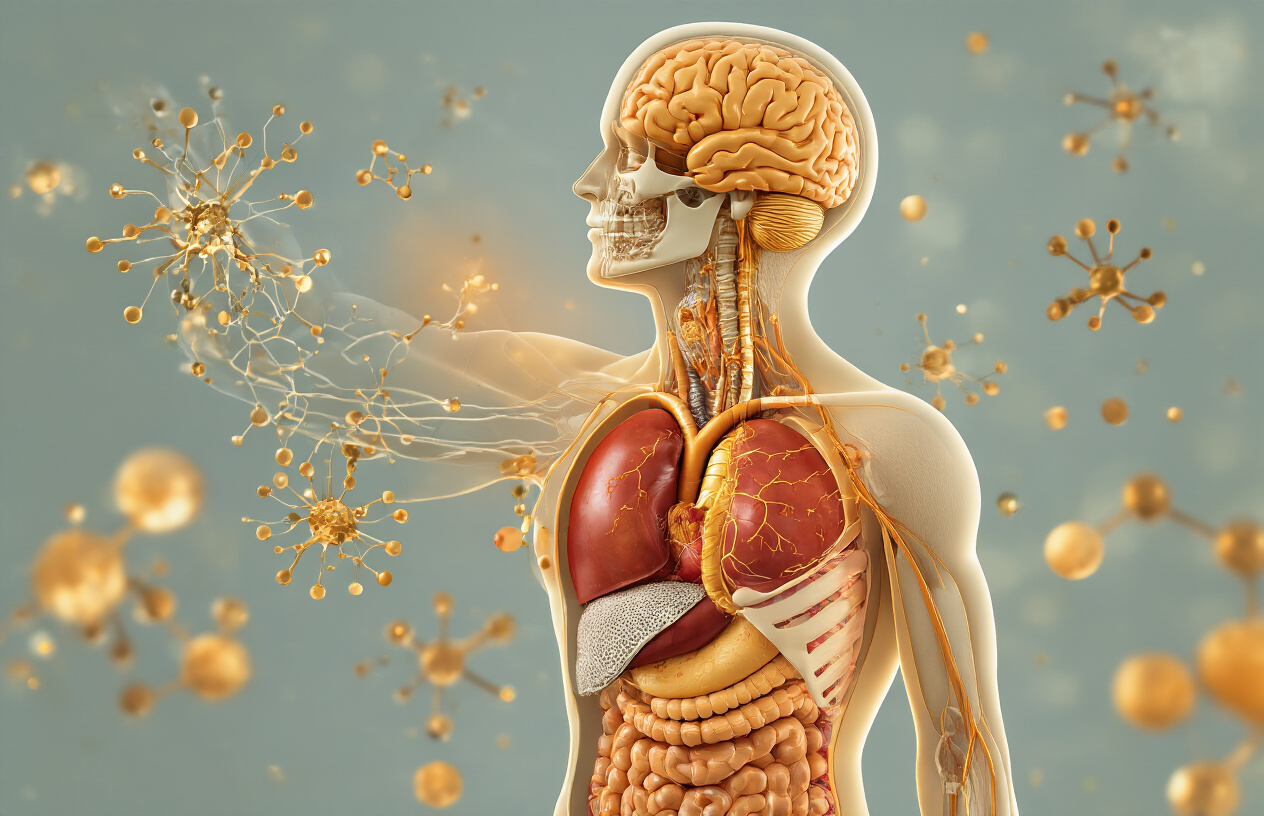
How thiamine powers your cellular energy production
Your cells depend on thiamine to convert the food you eat into usable energy. This vitamin acts as a crucial component of several enzymes that break down carbohydrates, proteins, and fats. The most important of these is the enzyme complex called pyruvate dehydrogenase, which transforms glucose into energy your cells can actually use.
Without enough thiamine, your cells struggle to produce ATP – the energy currency that keeps everything running smoothly. Think of thiamine as the spark plug in your body’s engine. When you’re getting adequate amounts, your metabolism hums along efficiently. When you’re deficient, you might feel tired, sluggish, or mentally foggy because your cells simply can’t generate the energy they need.
The process happens primarily in your mitochondria, those tiny powerhouses inside each cell. Thiamine helps these cellular factories work at peak efficiency, especially when you’re active or stressed. Athletes and people with demanding lifestyles often need more thiamine because their energy demands are higher.
Critical functions in nervous system health
Your brain and nervous system are thiamine’s biggest fans, and for good reason. Neural tissue burns through energy faster than almost any other part of your body, making thiamine absolutely essential for proper brain function.
Thiamine helps maintain the protective coating around your nerves, called the myelin sheath. This coating allows electrical signals to zip along your nerves quickly and efficiently. When thiamine levels drop, nerve signals slow down, leading to problems with memory, concentration, and coordination.
The vitamin also supports the production of several important neurotransmitters, including acetylcholine, which plays a key role in learning and memory. People with thiamine deficiency often experience:
- Mental confusion and difficulty concentrating
- Memory problems
- Irritability and mood changes
- Peripheral neuropathy (tingling or numbness in hands and feet)
- Muscle weakness
Your brain uses about 20% of your body’s total energy, so when thiamine levels are inadequate, cognitive symptoms often appear first. This is why chronic fatigue and brain fog are common early signs of thiamine deficiency.
Impact on cardiovascular and muscle function
Your heart is essentially a muscle that never gets to rest, pumping roughly 100,000 times per day. This constant activity makes it one of the most thiamine-dependent organs in your body. The vitamin helps ensure your heart muscle contracts efficiently and maintains a steady rhythm.
Thiamine deficiency can lead to a condition called beriberi, which affects the cardiovascular system in two main ways:
Dry beriberi affects the nervous system and muscles, causing:
- Muscle weakness and wasting
- Difficulty walking
- Loss of sensation in hands and feet
Wet beriberi impacts the cardiovascular system, leading to:
- Fluid retention and swelling
- Rapid heart rate
- Shortness of breath
- Heart failure in severe cases
Beyond the heart, thiamine supports all muscle function throughout your body. Skeletal muscles need this vitamin to contract properly and recover after exercise. When levels are low, you might notice muscle cramps, weakness, or slower recovery times after physical activity.
The vitamin also helps regulate blood flow and supports the health of blood vessels. Adequate thiamine intake helps maintain proper circulation, ensuring oxygen and nutrients reach all your tissues effectively.
Recognizing Thiamine Deficiency Signs and Symptoms

Early Warning Signs of Low Thiamine Levels
Your body provides subtle hints when thiamine levels start dropping. Fatigue hits first – not the normal tiredness after a long day, but a persistent exhaustion that doesn’t improve with rest. You might notice your appetite disappearing, making meals feel like a chore rather than something enjoyable.
Mental fog becomes another red flag. Concentration becomes difficult, memory feels fuzzy, and you might struggle with tasks that used to be second nature. Mood changes creep in too – irritability, anxiety, and a general feeling that something’s just off.
Physical symptoms include muscle weakness, particularly in your legs, and coordination problems that make you feel unsteady or clumsy. Some people experience tingling or numbness in their hands and feet, similar to pins and needles but more persistent.
Sleep patterns often become disrupted, with insomnia or restless sleep becoming common. Your heart might feel like it’s racing or beating irregularly, even during rest periods.
Severe Deficiency Conditions Like Beriberi and Wernicke-Korsakoff Syndrome
When thiamine deficiency progresses unchecked, serious neurological and cardiovascular conditions develop. Beriberi, historically known as the “rice disease,” manifests in two primary forms.
Wet beriberi attacks the cardiovascular system, causing heart failure, fluid retention, and swelling in the legs and feet. The heart struggles to pump blood effectively, leading to shortness of breath and chest pain.
Dry beriberi targets the nervous system, causing severe muscle weakness, nerve pain, and paralysis that typically starts in the legs and moves upward. Walking becomes increasingly difficult, and eventually impossible without intervention.
Wernicke-Korsakoff syndrome represents the most severe neurological consequence of thiamine deficiency. This condition primarily affects people with chronic alcohol abuse but can occur in anyone with severe deficiency.
Wernicke’s encephalopathy comes first, causing confusion, vision problems, and loss of muscle coordination. Without immediate thiamine treatment, it progresses to Korsakoff’s syndrome, characterized by severe memory loss and the inability to form new memories.
Risk Factors That Increase Your Deficiency Chances
Several lifestyle and medical factors significantly increase thiamine deficiency risk. Chronic alcohol consumption tops the list – alcohol interferes with thiamine absorption and increases the body’s thiamine requirements while simultaneously reducing food intake.
Diets high in refined carbohydrates and processed foods create problems because these foods require thiamine for metabolism but contain very little of the vitamin themselves. Think white bread, sugary snacks, and processed meals that fill you up without providing essential nutrients.
Certain medical conditions impair thiamine absorption or increase requirements. Diabetes, kidney disease, and gastrointestinal disorders like Crohn’s disease or celiac disease all interfere with proper thiamine utilization.
Medications can also deplete thiamine levels. Diuretics, commonly prescribed for high blood pressure, increase thiamine excretion through urine. Some antibiotics and chemotherapy drugs also interfere with thiamine metabolism.
Chronic stress, whether physical or emotional, increases thiamine requirements as your body works harder to maintain normal functions.
Groups Most Vulnerable to Thiamine Shortage
Certain populations face higher risks due to increased needs or absorption challenges. Pregnant and breastfeeding women require more thiamine to support fetal development and milk production, making deficiency more likely if dietary intake doesn’t increase accordingly.
Elderly adults face multiple risk factors: reduced appetite, medication interactions, and age-related changes in digestion that decrease nutrient absorption. Social isolation can worsen the problem when cooking and eating become less prioritized.
People with eating disorders, whether restrictive eating or frequent vomiting, severely limit thiamine intake and absorption. The body’s thiamine stores deplete quickly under these conditions.
Athletes and people with physically demanding jobs need more thiamine due to increased energy metabolism. Without adequate intake, performance suffers and deficiency risk rises.
Individuals following restrictive diets, particularly those eliminating entire food groups without proper planning, may inadvertently cut out major thiamine sources. This includes some vegetarian or vegan diets that aren’t well-balanced.
People with chronic illnesses, especially those affecting digestion or causing frequent hospitalizations, often develop thiamine deficiency due to poor intake, increased needs, or medication interactions.
Natural Food Sources Rich in Vitamin B1

Top plant-based thiamine powerhouses
Sunflower seeds reign supreme as nature’s richest thiamine source, packing an impressive 1.48 mg per cup. These tiny nutritional bombs deliver more than your entire daily requirement in a single serving. Pine nuts follow closely behind, offering substantial thiamine alongside healthy fats that help your body absorb this crucial vitamin.
Whole grains deserve serious attention for consistent thiamine intake. Brown rice contains significantly more thiamine than its white counterpart, while quinoa provides a complete protein package with excellent B1 levels. Oats make an outstanding breakfast choice, especially steel-cut varieties that retain maximum nutritional value.
Legumes bring remarkable thiamine density to your plate. Black beans, navy beans, and lentils offer substantial amounts while providing fiber and plant protein. Peas, particularly green peas, contain surprisingly high thiamine levels that many people overlook.
Nuts like macadamias, pistachios, and Brazil nuts contribute meaningful thiamine amounts. Asparagus stands out among vegetables, providing decent B1 levels along with folate and other nutrients. Acorn squash and butternut squash also deliver thiamine with natural sweetness.
Animal proteins containing high thiamine levels
Pork products lead the animal kingdom in thiamine content. Lean pork chops, tenderloin, and ham provide exceptional amounts of easily absorbed B1. Pork’s thiamine bioavailability surpasses most plant sources, making it incredibly efficient for meeting daily needs.
Fish offers excellent thiamine with additional omega-3 benefits. Salmon, tuna, and trout contain substantial B1 levels while supporting heart and brain health. Mussels and other shellfish provide concentrated thiamine in smaller portions.
Beef liver stands as an organ meat powerhouse, delivering impressive thiamine alongside iron, vitamin A, and other B vitamins. While not everyone’s favorite food, liver provides unmatched nutrient density for adventurous eaters.
Eggs contribute moderate thiamine levels while offering complete protein and choline for brain function. The yolk contains most of the B1, so whole eggs beat egg whites for thiamine intake.
Fortified foods that boost your intake
Breakfast cereals undergo mandatory thiamine fortification in many countries, making them reliable B1 sources. Look for whole grain options that combine natural thiamine with added amounts. Many cereals provide 100% of daily thiamine needs per serving.
Enriched bread and pasta products contain added thiamine after processing strips away natural B vitamins. While less ideal than whole grain versions, these staples help prevent deficiency in populations relying heavily on refined grains.
Nutritional yeast has become popular among plant-based eaters for its cheesy flavor and B vitamin content. This deactivated yeast provides substantial thiamine along with B12, making it valuable for vegans and vegetarians.
Plant-based milk alternatives like soy, almond, and oat milk often contain added thiamine to match cow’s milk nutrition. Check labels to find brands with the highest fortification levels for maximum benefit.
Optimal Daily Requirements and Absorption

Age-specific thiamine dosage recommendations
Your body’s thiamine needs change throughout your life, and getting the right amount depends on your age and gender. Infants need about 0.2-0.3 mg daily, while toddlers require around 0.5 mg. Children between 4-8 years old should aim for 0.6 mg, and those 9-13 years need 0.9 mg daily.
Adult men need 1.2 mg of thiamine daily, while women require 1.1 mg. These amounts might seem small, but they’re critical for proper nerve function and energy metabolism. Older adults often need the same amounts but may have trouble absorbing thiamine effectively, making dietary choices even more important.
| Age Group | Daily Thiamine Requirement |
|---|---|
| Infants (0-6 months) | 0.2 mg |
| Infants (7-12 months) | 0.3 mg |
| Children (1-3 years) | 0.5 mg |
| Children (4-8 years) | 0.6 mg |
| Children (9-13 years) | 0.9 mg |
| Men (14+ years) | 1.2 mg |
| Women (14+ years) | 1.1 mg |
Factors that enhance thiamine absorption
Your body absorbs thiamine best when you eat it with other B vitamins, creating a synergistic effect. Magnesium plays a key role in activating thiamine, so foods rich in both nutrients work together beautifully. Think whole grains, nuts, and leafy greens.
Eating thiamine-rich foods with healthy fats can also boost absorption. The fat doesn’t directly help thiamine absorption, but it slows digestion, giving your intestines more time to absorb this water-soluble vitamin. Cooking methods matter too – steaming and light sautéing preserve more thiamine than boiling or long cooking times.
Your gut health directly impacts how well you absorb thiamine. A healthy microbiome supports better nutrient uptake, while digestive issues can seriously hamper absorption.
Substances that block thiamine uptake
Alcohol is thiamine’s biggest enemy. Regular alcohol consumption depletes your body’s thiamine stores and blocks absorption in your intestines. People who drink heavily often develop thiamine deficiency, which can lead to serious neurological problems.
Certain compounds in raw fish and shellfish, called thiaminases, break down thiamine before your body can use it. Cooking destroys these enzymes, so sushi lovers should balance raw fish consumption with thiamine-rich cooked foods.
Coffee and tea contain tannins that can interfere with thiamine absorption when consumed in large quantities with meals. You don’t need to give up your morning coffee, but spacing it away from thiamine-rich meals helps maximize absorption.
Some medications also interfere with thiamine:
- Diuretics increase thiamine excretion
- Antacids can reduce absorption
- Some antibiotics may deplete thiamine stores
- Chemotherapy drugs often affect B vitamin levels
Special considerations for pregnancy and breastfeeding
Pregnant women need more thiamine – about 1.4 mg daily – to support their baby’s developing nervous system and their own increased energy needs. Morning sickness can make this challenging, as nausea often limits food choices and may increase nutrient losses through vomiting.
Breastfeeding mothers need even more thiamine, around 1.5 mg daily, since they’re passing this vital nutrient to their babies through breast milk. The concentration of thiamine in breast milk directly reflects the mother’s intake, making adequate nutrition crucial for both mother and child.
Women with hyperemesis gravidarum (severe morning sickness) face higher risks of thiamine deficiency and may need medical monitoring and supplementation. Some pregnant women develop a condition where they need much higher doses of thiamine than usual, though this is rare.
Both pregnant and breastfeeding women should focus on thiamine-rich whole foods rather than relying solely on prenatal vitamins, as food sources provide better absorption and additional supporting nutrients.
Health Benefits of Adequate Thiamine Intake

Enhanced Brain Function and Memory Protection
Thiamine acts as your brain’s best friend, powering the neurons that control everything from basic cognitive tasks to complex memory formation. When your thiamine levels are optimal, your brain cells can efficiently convert glucose into energy, keeping your mental sharpness at its peak.
Research shows that adequate thiamine intake helps protect against age-related cognitive decline. The vitamin plays a crucial role in synthesizing acetylcholine, a neurotransmitter essential for memory and learning. People with healthy thiamine levels often experience:
- Improved concentration and focus
- Better short-term and long-term memory retention
- Enhanced problem-solving abilities
- Reduced brain fog and mental clarity issues
Studies have also linked proper thiamine levels to protection against neurodegenerative conditions. The vitamin helps maintain the myelin sheath around nerve fibers, ensuring smooth communication between brain cells.
Improved Energy Levels and Reduced Fatigue
Think of thiamine as your body’s energy converter. This vitamin transforms carbohydrates into usable energy through its role in cellular metabolism. Without enough thiamine, your cells struggle to produce ATP (adenosine triphosphate), the energy currency your body runs on.
When you maintain adequate thiamine levels, you’ll likely notice:
- Sustained energy throughout the day
- Less afternoon crashes and fatigue
- Better physical endurance during exercise
- Improved recovery after physical activity
- Enhanced stamina for daily tasks
Athletes and active individuals particularly benefit from optimal thiamine intake, as their higher metabolic demands require efficient energy production systems.
Better Heart Health and Circulation
Your cardiovascular system relies heavily on thiamine for optimal function. This vitamin supports heart muscle contractions and helps maintain proper nerve signals to the heart. Adequate thiamine intake contributes to:
- Regular heart rhythm and stronger contractions
- Improved blood flow and circulation
- Better oxygen delivery to tissues
- Reduced risk of cardiovascular complications
- Support for healthy blood pressure levels
The heart uses significant amounts of energy, making thiamine essential for cardiac muscle function. People with optimal thiamine status often experience better exercise tolerance and improved overall cardiovascular health.
Support for Healthy Digestion and Metabolism
Thiamine keeps your digestive system running smoothly by supporting the nervous system that controls gut function. The vitamin helps produce stomach acid and digestive enzymes while maintaining proper muscle contractions in the digestive tract.
Key digestive benefits include:
- Enhanced nutrient absorption
- Better appetite regulation
- Improved gut motility and regular bowel movements
- Reduced digestive discomfort and bloating
- Support for healthy gut bacteria balance
Your metabolism also depends on thiamine for processing carbohydrates, fats, and proteins. This vitamin activates enzymes involved in metabolic pathways, helping your body efficiently use nutrients from food and maintain healthy weight management.
Thiamine Supplementation Guidelines

When supplements become necessary
Most people can get enough thiamine through a balanced diet, but certain situations call for supplementation. Chronic alcohol use severely depletes thiamine stores because alcohol interferes with absorption and increases the body’s need for this vitamin. People who drink heavily often develop deficiency even when eating thiamine-rich foods.
Medical conditions like Crohn’s disease, celiac disease, and chronic kidney disease can impair thiamine absorption or increase losses. Diabetes also raises thiamine requirements due to increased glucose metabolism. Older adults face higher risks because their digestive systems don’t absorb nutrients as efficiently, and they may have limited diets.
Pregnancy and breastfeeding increase thiamine needs significantly. Women who experience severe morning sickness may need supplements if they can’t keep food down for extended periods. Bariatric surgery patients often require long-term supplementation since their altered digestive anatomy affects nutrient absorption.
Athletes and people under extreme physical stress burn through thiamine faster due to increased energy metabolism. Those following restrictive diets, including vegans who don’t eat fortified foods, may need supplements to prevent deficiency.
Choosing the right thiamine supplement form
Thiamine comes in several supplement forms, each with different absorption rates and uses. Thiamine hydrochloride (thiamine HCl) is the most common and affordable option found in most multivitamins and B-complex formulas. It works well for general supplementation and mild deficiencies.
Benfotiamine offers superior bioavailability compared to standard thiamine HCl. This fat-soluble form crosses cell membranes more easily and stays in tissues longer. Research shows benfotiamine reaches higher concentrations in the blood and organs, making it particularly useful for people with diabetes or severe deficiencies.
Thiamine mononitrate provides stable, long-lasting effects and is often used in food fortification. It converts to active thiamine in the body but may not be as readily absorbed as other forms.
For severe deficiencies or medical conditions, healthcare providers might recommend thiamine injections or high-dose oral supplements. Allithiamine, a naturally occurring form found in garlic, shows promise for neurological conditions but requires more research.
When choosing supplements, look for products that have been third-party tested for purity and potency. Avoid products with unnecessary fillers or artificial additives that might interfere with absorption.
Safe dosage limits and potential side effects
Thiamine is remarkably safe because it’s water-soluble and excess amounts get flushed out through urine. The recommended daily allowance ranges from 1.1 mg for adult women to 1.2 mg for adult men, with higher needs during pregnancy and breastfeeding.
Therapeutic doses for treating deficiency typically range from 25-100 mg daily, while severe cases might require 200-300 mg or higher under medical supervision. Some studies have used doses up to 300 mg daily for months without adverse effects.
Side effects from oral thiamine supplements are rare, even at high doses. Some people report mild stomach upset when taking large amounts on an empty stomach. Taking supplements with food usually prevents this issue.
Allergic reactions can occur but are uncommon. Signs include skin rash, itching, or swelling. Severe allergic reactions are extremely rare but may include difficulty breathing or swallowing.
Injectable thiamine carries slightly higher risks, including potential allergic reactions at the injection site. Only healthcare providers should administer thiamine injections, typically reserved for severe deficiencies or when oral supplements aren’t effective.
Drug interactions are minimal, but thiamine absorption may decrease when taken with certain medications like diuretics or chemotherapy drugs. People taking these medications should discuss timing and dosage with their healthcare provider to ensure optimal absorption.
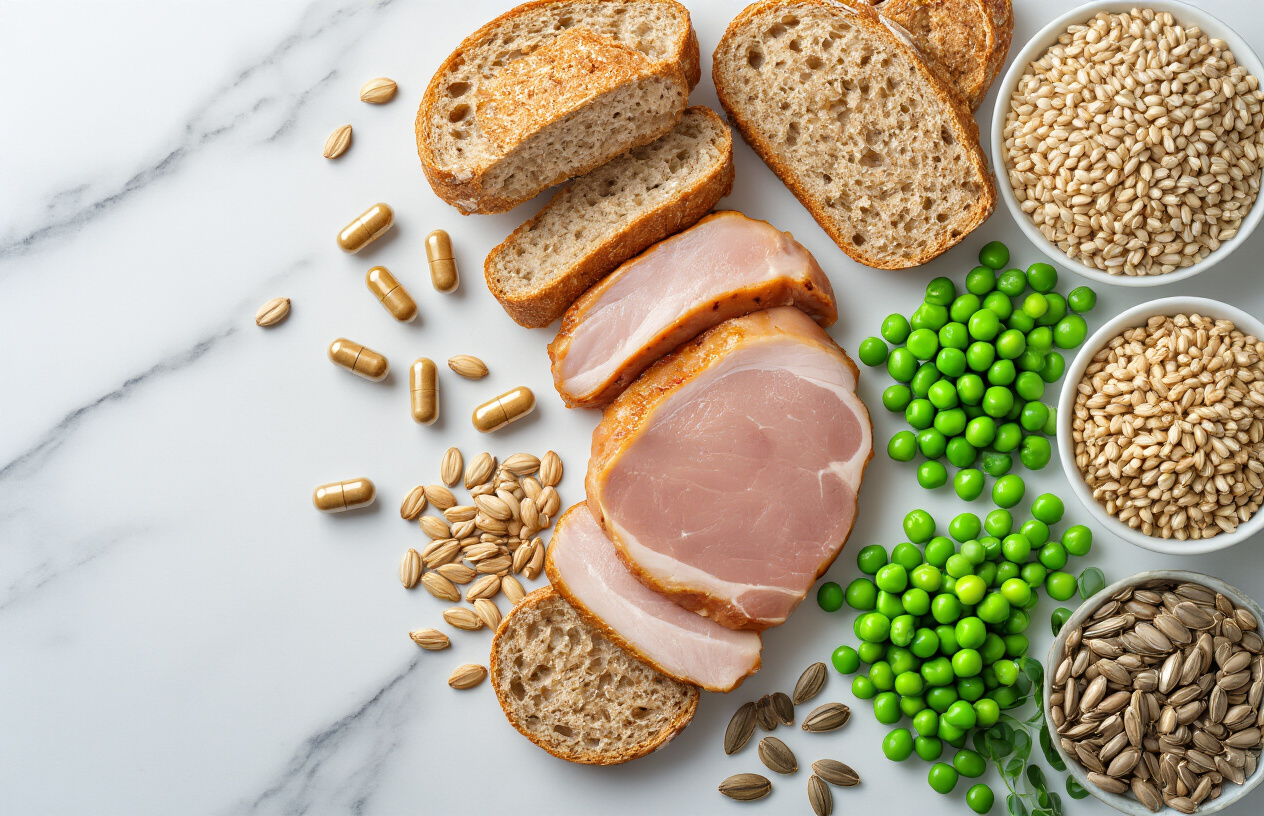
Thiamine plays a vital role in keeping your energy levels steady and your nervous system functioning properly. From converting carbohydrates into fuel to supporting brain health, this essential vitamin works behind the scenes to keep you feeling your best. The good news is that getting enough B1 doesn’t have to be complicated – whole grains, lean meats, legumes, and fortified foods can easily help you meet your daily needs.
If you’ve been experiencing fatigue, memory issues, or muscle weakness, it might be time to take a closer look at your thiamine intake. Start by adding more B1-rich foods to your meals and pay attention to how your body responds. While most people can get adequate amounts through a balanced diet, those with certain health conditions or dietary restrictions should talk to their healthcare provider about whether supplementation makes sense for them.
